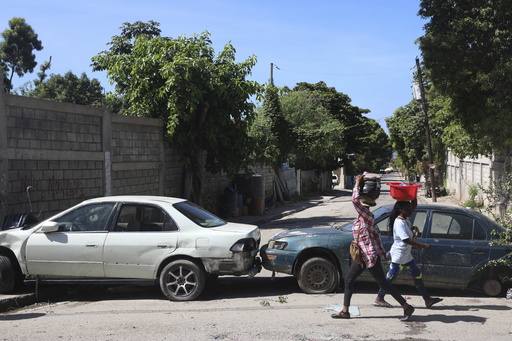
MEXICO CITY — In early November, Michelle Reed received a heartbreaking message from her 6-year-old adopted son, Esai Reed, who remains in a Haitian orphanage: “Mom, come get me.” As violence escalates in Haiti, U.S. aviation officials have imposed a 30-day restriction on flights to the country, complicating Reed’s efforts to reunite with her son, who is waiting for the necessary legal paperwork amidst the nation’s struggling infrastructure.
Reed feels a profound sense of fear, concerned that Esai may never be able to leave Haiti for their new home in Florida, where his biological brothers are eagerly waiting to see him. “Our kids sit in Haiti with no way out,” she expressed, admitting her uncertainty about his safety and future in such a perilous situation. Reed’s predicament reflects the broader plight of numerous families trapped by the current turmoil in Haiti, stemming from escalating violence and political instability.
The situation in Haiti took a turn for the worse when a transitional council dismissed interim prime minister Garry Conille over disagreements regarding the country’s governance. His successor, Alix Didier Fils-Aimé, was appointed as gangs exploited the disorder, launching violent acts that included attacking U.S. airlines at the Port-au-Prince airport, which is reportedly 85% under gang control, according to United Nations figures. One flight attendant was wounded as three airlines—JetBlue, Spirit, and American Airlines—faced gunfire while landing and taking off.
In response to the risks, the Federal Aviation Administration has restricted U.S. carriers from flying to Haiti for the next month. American Airlines has announced it will halt all flights until February, while the United Nations has temporarily suspended its flight services into Port-au-Prince, making the already dire humanitarian situation in Haiti even more precarious. Schools, banks, and government institutions have shuttered, and communal spaces have been left deserted.
For the children left behind, including Reed’s son, these developments pose severe challenges. Reed noted that Esai had been evacuated from his orphanage three separate times due to escalating violence. The resulting airline restrictions have further cut the island off from much-needed international support just as it faces the threat of famine.
Amidst the chaos, the United Nations has called for an end to the violence, advocating for “safe, sustained, and unimpeded humanitarian access.” On Wednesday, Port-au-Prince remained tense, with schools closed and the sounds of gunfire echoing in the streets. In a disturbing report, Médecins Sans Frontières (Doctors Without Borders) revealed that their medical workers were attacked by a mix of police and vigilante groups, creating a climate of fear as it hindered their ability to provide essential care.
In the midst of this turmoil, Reed’s anxiety grows as she imagines the worst possibilities for her son. The ongoing conflict has left many families like hers entangled in a complicated battle with both U.S. and Haitian authorities, as they strive to secure humanitarian parole for the roughly 70 children needing urgent assistance to exit the country.
Earlier this year, the U.S. had previously allowed a group of children similar to Esai’s case to travel outside Haiti when gangs had targeted critical infrastructure, resulting in long flight cancellations. However, families like Reed’s now feel trapped by a mixture of bureaucracy and violence that further complicates the journey to safety.
Although Reed has minimal contact with Esai, who affectionately calls her “mom” and carries her last name, she remains unable to visit him due to risks related to traveling and flight disruptions. Additionally, the recent departure of the orphanage director has left Esai under the care of others, adding to Reed’s concerns about his wellbeing and security.
While the U.S. government has expressed understanding regarding the distress of families trying to adopt from Haiti, it has not provided a viable solution for children without finalized adoption decrees. As families anxiously await updates amidst the spiraling violence, Reed articulated the collective wish of many: “We just want our children to survive.”
